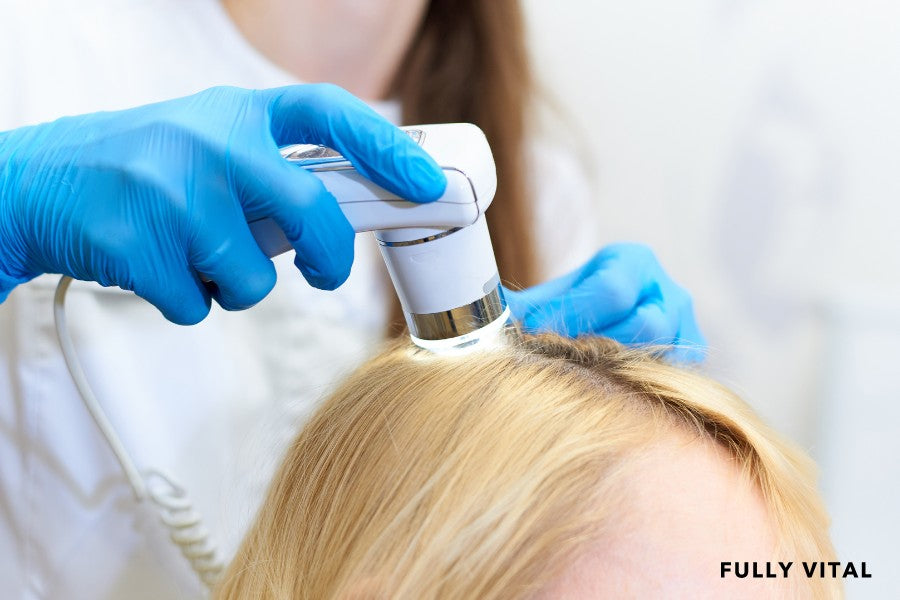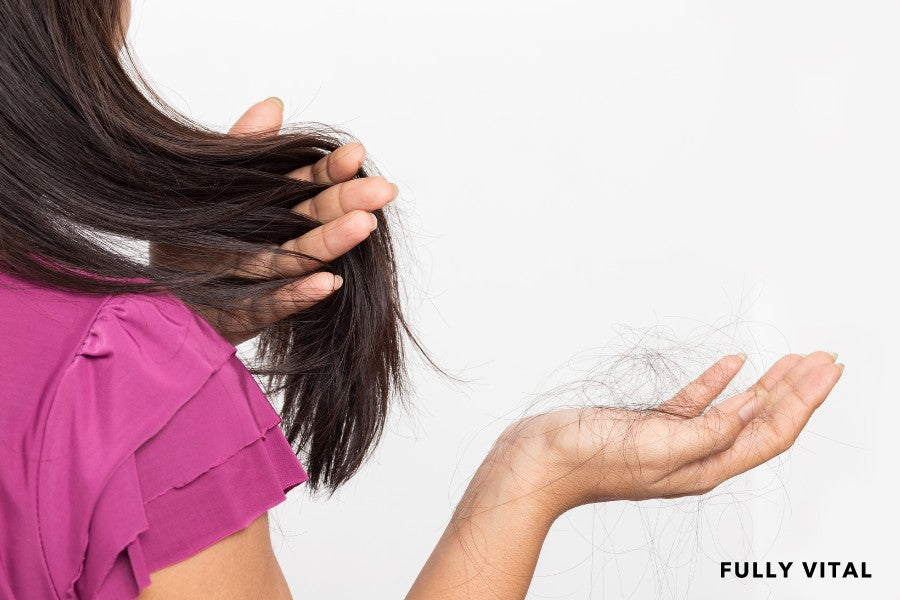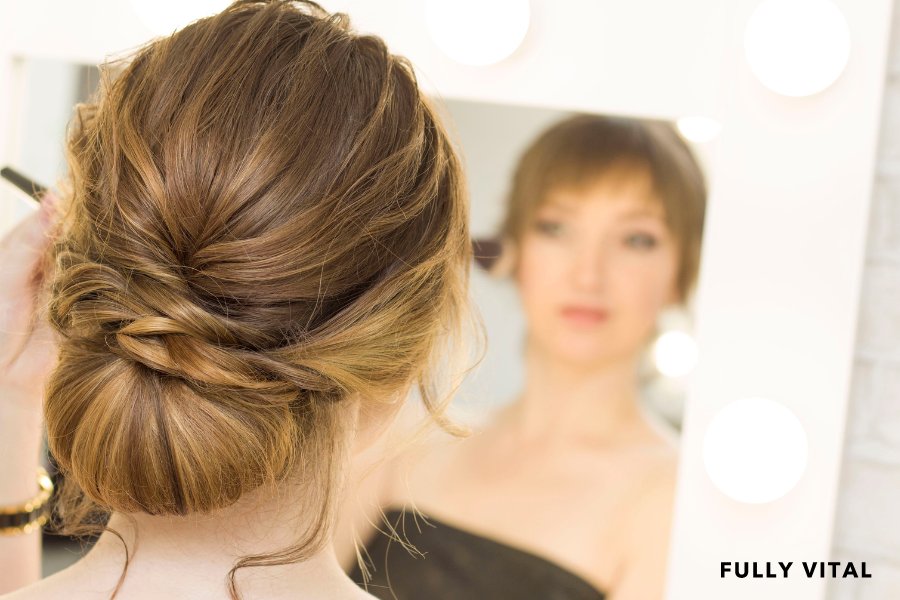
The Hair Expert's Guide To Spotting The Difference Between Fine And Thin Hair
In the pursuit of vibrant and voluminous hair, many women explore various avenues to restore their hair's glory.
Welcome to our comprehensive guide, where we dive deep into the realm of hair restoration.
Whether you have fine hair, thin hair, or any hair type in between, this guide will equip you with essential knowledge to embark on your hair restoration journey. Let's unlock the secrets to lush locks!

I LOVE MY HAIR NOW
FullyVital hair serum and hair vitamins made tremendous improvements in my hair. I truly love my hair now.
Dorit S.,
Exploring Innovations In Hair Restoration
In recent years, the field of hair restoration has witnessed remarkable innovations that have transformed the possibilities for achieving fuller hair.
From groundbreaking treatments to advanced technologies, we'll uncover the latest trends and breakthroughs that are reshaping the way we approach hair restoration.
Methods Of Hair Restoration
-
Hair Transplantation: A widely recognized method where healthy hair follicles are transplanted from one area of your scalp to another, creating a natural-looking hairline and increased density.1
-
Platelet-Rich Plasma (PRP) Therapy: Harnessing the power of your body's own platelets, PRP therapy stimulates hair growth and promotes thicker hair.
-
Low-Level Laser Therapy (LLLT): Utilizing low-level lasers, this non-invasive technique enhances blood flow to the scalp, encouraging hair growth.
-
Topical Treatments: From foams to serums, various topical treatments contain potent ingredients that support hair regrowth and prevent further thinning.
Setting Realistic Expectations
It's essential to approach hair restoration with a clear understanding of what to expect.
While the journey to fuller hair is exciting, it's important to acknowledge that results may vary based on individual factors.
Let's discuss the realistic timeline for visible improvements and how to stay patient throughout the process.
Long-Term Maintenance For Hair Restoration
Achieving the hair you desire is a journey that extends beyond the initial restoration phase.
Discover expert tips on maintaining your newfound hair vitality for the long haul. From recommended hair care routines to nurturing lifestyle choices, we'll ensure your radiant locks stand the test of time.
Preparing For Hair Restoration
- Before embarking on your hair restoration journey, thorough preparation is key. This section will guide you through the essential steps to take before undergoing any hair restoration procedure.2 From consultations with experts to understanding the commitment required, you'll be fully prepared to take this transformative step.
Natural Remedies to Restore Hair Growth
When it comes to hair restoration, nature provides a treasure trove of remedies that can nurture your hair back to its full glory. Here are some effective natural solutions:
Aloe Vera
Aloe vera contains enzymes that promote hair growth by unclogging hair follicles and providing nourishment to the scalp.
Apply fresh aloe vera gel directly to your scalp and leave it on for about 30 minutes before rinsing.
Coconut Oil
Coconut oil is rich in fatty acids that penetrate the hair shaft, providing moisture and strengthening from within. Warm up coconut oil and massage it into your scalp, leaving it on overnight for best results.
Onion Juice
Onion juice might have a strong odor, but it's sulfur content can enhance blood circulation to the hair follicles, promoting hair growth. Apply onion juice to your scalp, leave it for 15 minutes, then wash thoroughly.
Top Foods and Nutrients for Hair Restoration
Your diet plays a crucial role in the health of your hair.
Including certain foods and nutrients can aid in hair restoration and growth:
Protein-Rich Foods
Hair is composed mainly of a protein called keratin.
Incorporate lean meats, eggs, legumes, and nuts to provide your body with the building blocks it needs for hair growth.
Biotin
Biotin, a B-vitamin, is essential for hair health. Foods like eggs, sweet potatoes, and nuts are excellent sources of biotin that can contribute to hair restoration.
Omega-3 Fatty Acids
Omega-3 fatty acids found in fatty fish like salmon and flaxseeds can help nourish the scalp and promote healthy hair follicles.
The Psychological Impact of Hair Loss and How Restoration Helps
Hair loss can have a profound psychological impact, affecting self-esteem and confidence.
Fortunately, hair restoration can provide more than just physical benefits:
Boost in Confidence
Regaining lost hair can lead to a significant boost in confidence and self-image.
Feeling good about your appearance can positively impact various aspects of your life.
Emotional Well-being
Hair loss can cause emotional distress.
The process of restoring hair can be empowering and serve as a positive step towards reclaiming emotional well-being.
Sense of Normalcy
For many, having a full head of hair is synonymous with feeling "normal." Hair restoration can help individuals feel more like themselves again.
What Is Hair Restoration?
Hair restoration refers to a set of innovative procedures and treatments designed to counter hair thinning, loss, and promote regrowth.
It encompasses various methods tailored to individual needs, aiming to restore hair density and confidence.
From surgical interventions to non-invasive therapies, hair restoration offers solutions for those seeking to rejuvenate their locks.
Surgical Hair Restoration
-
Hair Transplantation: Involves relocating healthy hair follicles to areas with thinning or no hair, resulting in a natural and fuller appearance.
Non-Surgical Hair Restoration
-
PRP Therapy: Utilizes platelet-rich plasma derived from your own blood to stimulate hair growth.
-
LLLT (Low-Level Laser Therapy): Non-invasive treatment using low-level lasers to improve blood flow and encourage hair follicle activity.

Why Is Hair Restoration Important?
Hair restoration holds immense significance for individuals who experience hair thinning or loss.
Beyond the aesthetic aspect, hair plays a pivotal role in boosting self-esteem and confidence.
By addressing hair concerns, restoration treatments empower individuals to regain a sense of identity and reclaim their self-assurance.
How Does Hair Restoration Work?
Hair restoration methods operate on the principles of stimulating dormant hair follicles, improving blood circulation to the scalp, and enhancing overall hair health.
Whether through surgical transplantation or non-invasive techniques, the goal is to foster an environment conducive to hair regrowth.3
Benefits Of Hair Restoration Treatment
Hair restoration treatments offer a plethora of benefits that extend beyond a fuller head of hair.
These advantages include:
Enhanced Confidence
A rejuvenated appearance leads to increased self-assurance and improved quality of life.
Natural Results
Modern techniques provide natural-looking outcomes that blend seamlessly with existing hair.
Tailored Solutions
Individualized approaches ensure treatments align with specific needs and preferences.
Long-Term Effects
Some treatments yield lasting results, reducing the need for constant maintenance.

What Are The Alternatives To Hair Restoration?
For those exploring alternatives to hair restoration, several options exist:
-
Topical Treatments: Over-the-counter or prescription treatments can slow hair loss and promote growth.
-
Hairstyling Techniques: Certain hairstyles and products can create the illusion of thicker hair.
-
Wigs and Hairpieces: These provide immediate cosmetic solutions without invasive procedures.
-
Lifestyle Modifications: Maintaining a balanced diet, reducing stress, and proper hair care can contribute to healthier hair.
Experience the Power of Restored Hair with Fully VitalAt Fully Vital, we're more than just a hair growth product company—we're your partner on the journey to vibrant, confident hair. Our range of meticulously crafted hair growth solutions is designed to:
Join the movement toward renewed hair and reinvigorated confidence. Elevate your hair care routine with Fully Vital and experience the transformation that only science-backed solutions can provide. |
Final Thoughts On Restore Hair
Nurturing and revitalizing your hair is essential for maintaining a vibrant and youthful appearance.
Embracing a comprehensive hair care routine can help combat the effects of aging and ensure that you continue to enjoy a lustrous mane.
At Fully Vital, we understand the significance of a healthy relationship with your locks.
Our range of innovative hair growth products is designed to halt the signs of aging, promoting stronger, fuller hair.
Discover the transformative power of our products and embark on a journey to reinvigorate your hair's natural beauty.
Remember, your hair deserves the very best – choose Fully Vital for a renewed sense of confidence and vitality.
Frequently Asked Questions About Restoring Hair
Is hair restoration effective for all hair types?
Hair restoration can be effective for various hair types, but individual results may vary. It's crucial to consult with a professional to determine the best approach for your specific hair type and condition.
Are there any side effects associated with hair restoration treatments?
Like any medical procedure, hair restoration treatments may have potential side effects.
These can range from minor discomfort to temporary changes in the scalp. Consulting with a qualified specialist will help you understand the potential risks and benefits.
How soon can I expect to see results after a hair transplant?
Visible results after a hair transplant typically emerge within several months.
However, it's important to note that full results may take up to a year to become apparent as the transplanted hair gradually grows and blends in naturally.
Can I undergo multiple hair restoration treatments?
Depending on your individual needs and the recommendations of your hair restoration expert, undergoing multiple treatments might be a viable option.
It's essential to follow professional advice to ensure the safety and effectiveness of any additional procedures.
Are there natural ways to promote hair growth?
Absolutely! Alongside professional treatments, maintaining a healthy lifestyle can contribute to hair growth. A balanced diet rich in vitamins and minerals, regular exercise, and stress management can all play a role in supporting hair vitality.
What causes hair thinning and loss in women?
Hair thinning and loss in women can be caused by a variety of factors, including genetics, hormonal changes, medical conditions, and lifestyle factors.
Identifying the underlying cause is crucial for determining the most effective restoration approach.
Can I undergo hair restoration if I have a sensitive scalp?
Yes, many hair restoration methods are suitable for individuals with sensitive scalps.
However, it's important to communicate your scalp's sensitivity to your chosen specialist so they can tailor the treatment accordingly.
Are there age restrictions for hair restoration procedures?
While there isn't a specific age restriction, candidacy for hair restoration procedures often depends on factors such as overall health and the extent of hair loss.
Consultation with a specialist will help determine the most appropriate treatment plan based on your age and unique circumstances.
Will my restored hair require special care?
Maintaining your restored hair might involve adjustments to your hair care routine.
Your specialist will provide guidance on shampoos, conditioners, and styling products that support the health and longevity of your restored hair.
Can I combine different hair restoration methods?
In some cases, combining multiple hair restoration methods can yield more comprehensive results.
Your specialist will assess your unique situation and recommend a customized plan that may involve a combination of treatments for optimal outcomes.
Source:
-
Khanna, M. (2008). Hair transplantation surgery. Indian Journal of Plastic Surgery : Official Publication of the Association of Plastic Surgeons of India, 41(Suppl), S56–S63. https://www.ncbi.nlm.nih.gov/pmc/articles/PMC2825128/
-
Preparing for your Hair Transplant - Hair Transplant Surgery Guide. (n.d.). Www.medic8.com. https://www.medic8.com/healthguide/hair-loss/hair-transplant/preparing.html
-
Rose, P. (2015). Hair restoration surgery: challenges and solutions. Clinical, Cosmetic and Investigational Dermatology, 361. https://doi.org/10.2147/ccid.s53980







